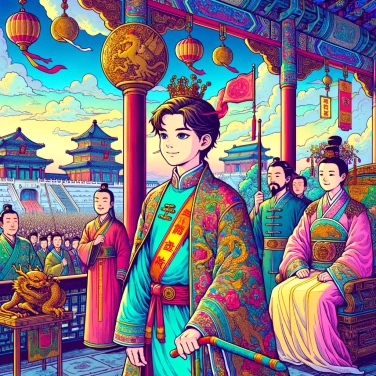In detail, for those interested!
Possibility 1: Historical Context
The rapid ascent of Puyi to the imperial throne of China can be attributed to a complex and tumultuous historical context marked by major political events. Indeed, the fall of the Qing dynasty and the establishment of the Republic of China in 1912 led to upheavals within the country, leaving a vacant place in the imperial power.
Puyi became the emperor of China as a baby in 1908, succeeding his uncle, Emperor Guangxu, who had died without a direct heir. This early succession was favored by the political maneuvers of powerful warlords and influential members of the imperial court, seeking to consolidate their own power by controlling a young and inexperienced emperor.
Political instability and power struggles within imperial China therefore contributed to placing Puyi on the throne at such a young age, making him the last emperor of China and symbolizing the end of a millennium-long era of imperial rule in the country.
Possibility 2: Influence of Tradition on the Succession to the Throne
The succession to the throne in China was strongly influenced by millennia-old traditions. For centuries, the reigning dynasty passed power from father to son, ensuring dynastic continuity. This practice was deeply rooted in Chinese culture and beliefs, which placed great importance on family lineage and the legitimacy of royal blood.
When there were disagreements within the imperial family, succession rules could be contested, sometimes leading to internal power struggles. Family tensions and rivalries among different members of the imperial family could complicate the designation of a legitimate successor.
In some cases, rival factions within the imperial court could manipulate the succession to the throne to serve their own interests. Political influences and court intrigues could therefore play a major role in the designation of the next emperor, even if it went against established traditions.
Pressures from courtiers and imperial advisors could also influence the succession to the throne, favoring a more malleable or favorable candidate. These external influences could sometimes bypass established traditions and rules to ensure the stability of the reigning dynasty.
Possibility 3: Internal and External Conflicts
Internal and external conflicts also played a crucial role in the youth of the Chinese emperor. During the 19th century, China was shaken by civil wars, rebellions, and conflicts with foreign powers. These conflicts weakened the ruling Qing dynasty and led to political instability. The Opium Wars, the Taiping and Nian rebellions, as well as foreign interventions during the Boxer Rebellion, deeply disrupted the Chinese empire.
These incessant struggles weakened imperial authority and created a climate of chaos and disorder. The emperor's youth at his ascension can be partly attributed to the need to ensure a quick and stable transition of power in a context of turmoil and conflict. The internal and external pressures exerted on China contributed to weakening the emperor's position and led to sometimes hasty political decisions.
Internal conflicts, such as revolts and rivalries within the imperial court, as well as tensions with foreign powers seeking to expand their influence in China, created an unstable and volatile political environment. These factors inevitably influenced the rise to power of a young and often inexperienced emperor, faced with complex and often insurmountable challenges.
Possibility 4: Consequences of Foreign Imperialism
Consequences of Foreign Imperialism: Foreign imperialism deeply influenced China during the 19th century. The Opium Wars, unequal treaties, and loss of sovereignty weakened the Qing dynasty. Foreign powers such as Britain, France, Germany, and Japan imposed their will on China, fragmenting its territory and undermining its central authority.
The humiliation caused by these events contributed to the rise of nationalist and anti-dynastic sentiment among the Chinese. Revolts and uprisings multiplied, threatening the stability of the empire. In this context of turmoil and external pressures, the youth of Emperor Puyi played a crucial role. Ascending to the throne in 1908 as a child, Puyi was manipulated and used as a puppet by rival factions and foreign powers.
His lack of political experience and maturity made his position precarious and facilitated foreign interference in Chinese affairs. Despite his late attempts at reforms, the 1911 revolution ultimately overthrew the Qing dynasty and proclaimed the Republic of China. Thus, the consequences of foreign imperialism contributed to the fall of the imperial monarchy in China and the advent of a new and tumultuous era in the country's history.
![Explain why some countries change time zones?]()
![Explain why chilling the butter before working it into puff pastry dough ensures a better texture.]()
![Explain why Alexander the Great refused to wear shoes.]()
![Explain why Alexander the Great always wore an impressive helmet.]()





















